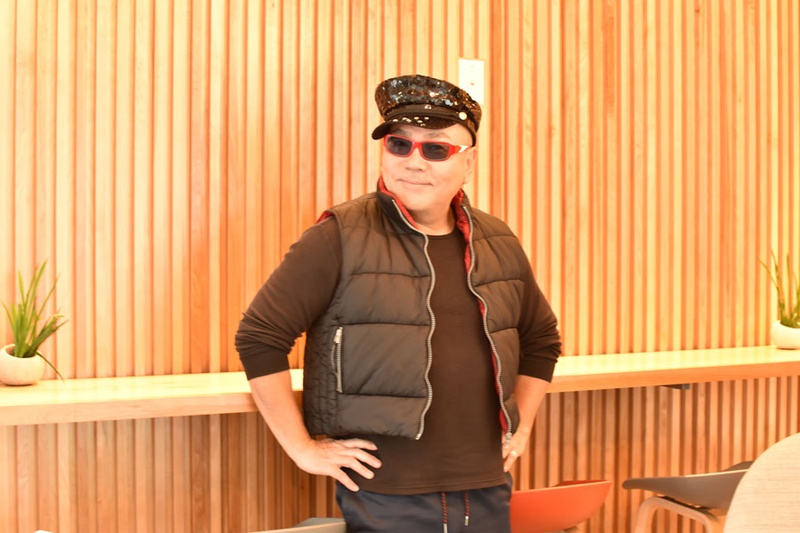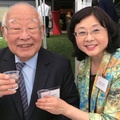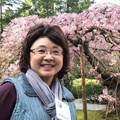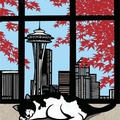Based in New York, Tosi Cappuccino performs solo cabaret shows all over the world. He came out as gay, and in 2014 became the first Japanese person to marry a same-sex couple in New York State. We spoke to Tosi, who says he is "the most fulfilled person in his life right now," about his turbulent life and the secret to making life richer.
* * * * *
I was always hiding and nervous.
I've always wanted to be a singer since I was little. I'm from "Star Tanjo". I won the Fukuoka Prefectural Tournament, but unfortunately the placard didn't go up in the finals. I didn't give up, so I went to Tokyo and sang in Shinjuku, Yokohama, Yokosuka, and the US military base in Atsugi. This was in the 1980s.
At the time, being gay was a big problem for me. Coming out was taboo, and if you were found out, you couldn't survive in that society. On stage, the audience wouldn't be satisfied unless you stripped yourself bare and showed everything. But I was always hiding myself and nervous. I thought, "This isn't good," and quit singing.
Actually, after that, I was surrounded by men. He was a fashion designer who traveled back and forth between Japan and Europe, and he valued food, clothing, and shelter, and lived a beautiful life. I learned a lot from him, including that kind of sensibility, as someone who grew up in the countryside.
A ticket to New York fell from the sky
I was about 27 or 28 years old when he dumped me and I went back to a poor life. "If he's European, I want to speak English and become an international person!" I thought to myself. I asked an acquaintance for advice and he introduced me to a job at a travel agency in Australia. I immediately accepted because I wanted to learn English, but when I got there, it was completely different from what I had imagined. The Australia I had imagined was a country that was tolerant of gays, open, and easy to live in. However, it was very conservative, and I was harassed at work. I had lived in hiding desperately in Japan, and the same thing happened in Australia, and I wondered, "What am I doing?" At that time, I happened to find a flyer for a cheap flight to New York on my desk. "It fell from the sky!" I really felt that way. I immediately took a two-week vacation and went to New York for the first time.
New York in 1992. When I arrived, I was so surprised! There was a heaven like this, a place where men who love other men could live so happily. People didn't say anything when they saw men kissing or hugging each other on the street. I had an intuition that "this is the place for me." I decided to live in New York within 4 or 5 days of arriving.
After returning to Japan and working for two years to save up some money, I went to New York on a tourist visa in May 1995. I was 33 years old and thought that if I had delayed it by another year, I would never be able to go abroad. If I had given up, I'm sure I would have lived a truly miserable life. I might have returned to the countryside in Fukuoka, hidden the fact that I was gay, entered into a fake marriage for my parents' sake, and even had children. It would have been a terrible life. How miserable and sad it is to live a life that lies to yourself. No matter what people say, live honestly. I think that's the best thing.
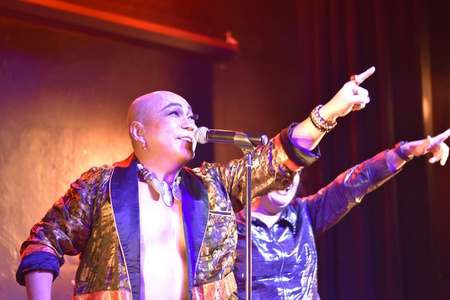
An encounter that saves a life
I didn't have any connections or anything. But I guess I was born under a good star, because someone always appears when I'm in a difficult situation (laughs). In March 1995, before I went to the US, the off-Broadway show "Stomp" had its first performance in Japan. A friend who worked at a production company asked me, "We're looking for an interpreter for the Stomp show in Osaka and Tokyo. Would you like to do it?" I refused, saying, "I can't speak English at all, so I can't be an interpreter!" He said, "Just take the audition." There were a lot of amazing people who were returning from overseas, and I don't know what I did wrong, but I was chosen. And luckily, there was no English test. I became the exclusive translator for Stomp.
It was really hard. Every day was a tightrope walk. I was only thinking about how to get by (laughs). Even when I was called to a dinner with the president, the interpreter was terrible, and when I translated a 3-minute talk, it became 10 seconds. Everyone called me "an interpreter who can't speak English." But the performers liked me, and they appreciated and thanked me for my hard work. I'm still friends with the performers.
At that time, the official photographer of Stomp who came from New York was Japanese and happened to have his phone number. When I arrived in New York and couldn't find a place to stay, I was at a loss, so I contacted the number. "I'm sorry, I have nowhere to go, but can you let me stay?" Despite the suddenness of the situation, he not only let me stay, but he was also good friends with the president of Toho's New York branch at the time, and introduced me to him. So I got a job right away. It was an encounter.
It's thanks to that president that Japan has a musical industry today. He acquired the performance rights to famous plays such as "My Fair Lady," "Man of La Mancha," "Les Miserables," and "Miss Saigon," and brought them to Japan. I wasn't originally interested in musicals, but after I became his assistant, we went to the theater together, and I checked his critique manuscripts, and it was a natural progression for me to become a musical critic myself.
New York changed everything for me
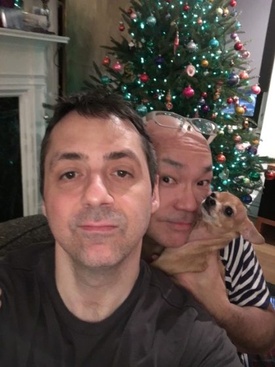
I started doing shows in 2005. It was a decision I made to myself that I was going to live in New York. From the beginning, I had no intention of staying here forever, and there were times when I wavered and thought about going back home. This was especially true in the 10 years before I met my husband Todd in 2004. It's difficult for a Japanese person to live alone abroad.
I guess I was quiet and easy to handle as a child. I think New York changed me. I don't have to hide myself, so I'm no longer afraid of anything. Todd is the complete opposite of me now, the type who would never cross the street when the light is red. It's like I'm American and he's Japanese. I wonder if that difference is good for him. I have to decide everything, even about travel and meals (laughs). I came to America, got married, traveled around the world doing the job I love, and had one fun encounter after another. Even if I'm doing Showa pop music, I'll try opera next year, and once I finish one, I can see the next challenge. I'm having so much fun now. I wonder if it's okay to be this happy. I feel like I've finally found my place and what I have to do. I'm so happy that I've found something that I'm determined to do for the rest of my life in my short life.
No matter what people say or how little I'm recognized, I've had a strong will to "continue doing it" that's completely 100% within me for the past two or three years. Of course, I have to constantly improve the quality of my shows, I want to wear innovative costumes, and there are so many things to think about, and when I go on tour, it's hard to manage my finances. I get happy and sad about the results of my shows, but I'm very grateful for my current situation.
A show created through the Tosi Cappuccino filter
The theme of this show (in Seattle) is Showa Kayo. People who live in New York don't say it out loud, but they think, "What, that's it?" Even though there's jazz and Broadway. But as we Japanese get older, we go back to Japan. I grew up in the Showa era, so I'm good at Showa Kayo, and considering my fan base, which is mainly women in their 40s to 60s, Showa Kayo was perfect. However, I don't think it would be interesting at all if I were to do Showa Kayo as an unsuccessful Japanese singer living in Japan. I've been watching Broadway in New York for 25 years, so I'm sure it's a show that Japanese people living in Japan couldn't do. My show contains theatrical elements, and I think it's heavily influenced by Broadway.
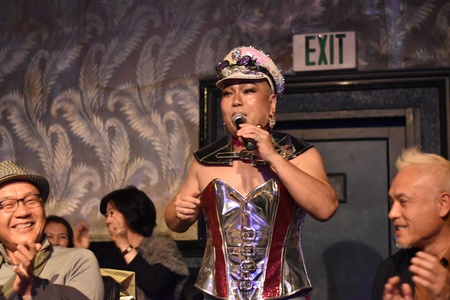
This year (2019) I've been using Japanese in Showa era pop songs, so next year I want to make it a show that English speakers can watch, with an English MC and lots of English songs, and expand my American fan base. My goal is to appear on Kohaku next year or the year after, so I'm thinking about how to do that. I have to say everything. It won't happen.
If you find something you like as a child, the greatest happiness for a person is to continue doing it for the rest of their life. There is nothing more unfortunate than forcing yourself to do something you don't want to do because you have to fit in with others or because your parents tell you to. I love singing and I absolutely wanted to be a singer, but I gave up once and went back to a normal job. But when I came to New York, I was able to start singing again. So, if your child says, "I want to do this," I think the shortcut to making them happy is for parents to support them.
* * * * *
Toshi Cappuccino: Born in Fukuoka Prefecture. Performing arts critic, cabaret singer, entertainer, and producer. He is a Japanese judge for the Drama Desk Awards, which is made up of 130 theater critics and journalists. With a triumphant return to Osaka in December, his Seattle performance of "A Little Studio at Night: The Showa Kayo" on October 8, 2019 was sold out.
*This article is reprinted from Soy Source (November 23, 2019).
© 2019 Hitomi Kato / Soy Source


